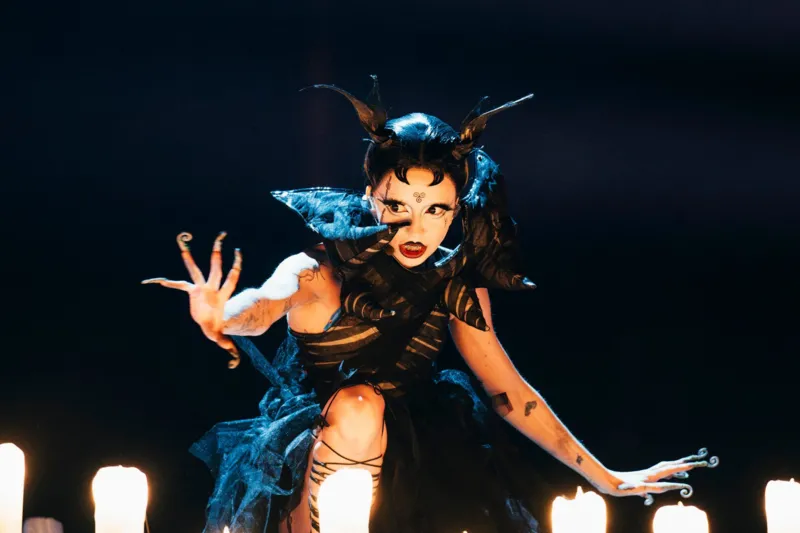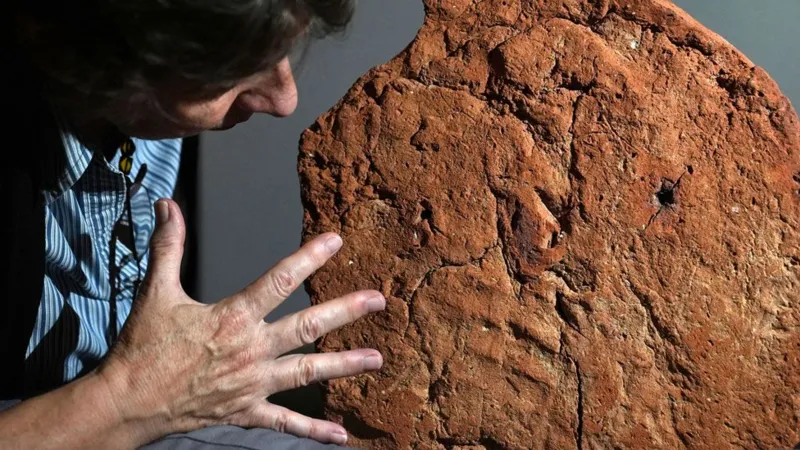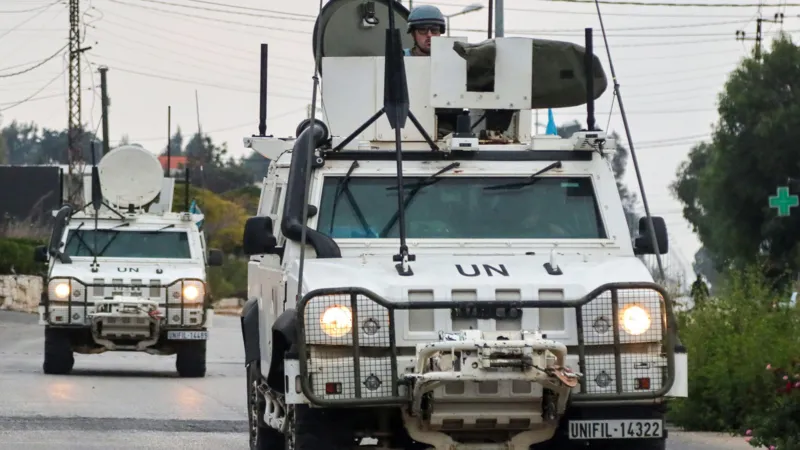Ireland's goth gremlin through to Eurovision final
Ireland has broken its Eurovision "curse", qualifying for the contest's grand final for the first time since 2018.

Appropriately enough, it did so with the help of a "goth gremlin goblin witch” - aka singer Bambie Thug, whose electro-metal anthem Doomsday Blue is now among the favourites to win.
Other acts who made it through Tuesday's first semi-final included Croatia's Baby Lasagna and Finland's Windows95Man, as fans revelled in the year's most out there performances.
However, it was bad news for Eurovision fanatics in Australia. Their act, Electric Fields, failed to qualify, as did entries from Moldova and Iceland.
Meanwhile, organisers had to apologise after one of Tuesday's performers displayed a pro-Palestinian symbol.
Eric Saade, who was among the show's opening acts, wore a keffiyeh - a type of scarf commonly used by people who want to show they are pro-Palestinian - on his arm.
A spokeswoman for the European Broadcasting Union (EBU) said: "The Eurovision Song Contest is a live TV show.
"All performers are made aware of the rules of the contest, and we regret that Eric Saade chose to compromise the non-political nature of the event."
Ahead of the event at Sweden's Malmö Arena, fans were warned not to bring Palestinian flags, symbols or bags into the audience. Strict security checks were carried out on members of the audience.
The run-up to the contest has been characterised by opposition to Israel's participation, amid concerns over the humanitarian cost of the war in Gaza.
Ireland's Bambie told reporters they were "ordered" to remove political gestures from their outfit ahead of the semi-final performance.
Their costume had originally included an ancient Celtic writing known as Ogham - which they said had spelt "ceasefire" and "freedom for Palestine".
Ogham is an ancient Irish alphabet, represented by a series of marks on stones and it is the earliest written source of the Irish Language, dating back to the 4th Century AD.
"It was very important for me because I am pro-justice and pro-peace, unfortunately I had to change those messages today... [an] order from the EBU," Bambie said.
Israel's representative, 20-year-old Eden Golan, has reportedly been confined to her hotel room while she is not performing, due to heightened security concerns.
She will make her debut during Thursday's second semi-final.
The political row did not overshadow Tuesday's opening semi-final, where 18 acts performed, including the UK's entrant Olly Alexander - who has previously called for "an immediate and lasting ceasefire" in Gaza, but refused calls to boycott the event.
The singer put on an energetic performance of his synth-pop single Dizzy, using camera effects and intricate choreography to make it look as though he was in a spaceship hurtling towards earth.
Dressed in a white singlet, red trousers, and distressed boots, he danced so hard that the battery pack for his microphone detached from his costume. He was seen clasping it in his right hand for the final moments of the performance.
Despite the mishap, the UK did not have to worry about the public vote on Tuesday. It is one of five countries that qualifies automatically for the final, due to its financial contribution to the contest.
Sweden, who were last year's winners, also get a free pass.
When are the Eurovision semi-finals and final?
Who qualified from the first semi-final?
The 10 acts who succeeded in Tuesday's public vote were:
- Serbia
- Portugal
- Slovenia
- Ukraine
- Lithuania
- Finland
- Cyprus
- Croatia
- Ireland
- Luxembourg
Going home were Moldova, Iceland, Australia, Poland and Azerbaijan.
The results were something of a shock for Iceland's Hera Björk and Moldova's Natalia Barbu.
Both were former Eurovision contestants, who were hoping to capitalise on their association with the contest, and perhaps improve upon their previous scores.
However, it was not to be. Their songs were ranked poorly with bookmakers and fans alike and, in the end, the public vote could not save them.
Croatia's Baby Lasagna are currently the favourites, and they sailed through the semi-final with the agreeably daft foot-stomper Rim Tim Tagi Dim.
The song tells the story of a farm boy setting out for the big city (sample lyric: “I’m a big boy now and I sold my cow”) - and is allegedly about the damaging effects of Croatia's brain drain.
Equally entertaining is Finland's Windows95Man, who spends his stage time "arguing" with Eurovision officials about whether he can perform naked from the waist down.
A well-known performance artist and DJ at home, he makes ample use of stage props to cover his modesty... before triumphantly donning a pair of jean-shorts for the song's climax.
The country, which has won five times, pulled out after being relegated from the 1994 contest and resisted attempts to lure them back... until now.
Marking the 40th anniversary of their last win, they entered the slinky pop anthem Fighter, sung by 23-year-old Tali Golergant - and duly went through to the final.
Ireland will also be delighted by their success. Tied with Sweden as the most successful country in Eurovision history (with seven wins each), it has failed to qualify in eight of the last 10 competitions.
The selection of Bambie Thug, a non-binary artist whose song dabbles in the occult, was condemned by some priests in the predominantly Catholic country - but its creative staging and unlikely fusion of musical genres have made it a favourite amongst fans.
"I wanted to showcase all the facets of myself like spoken word poetry, singing, jazzy crooning, metal, screaming, I squeeze it all in," Bambie told the BBC earlier this week.
Eurovision royalty performs
The first semi-final was themed around the idea that "you don't have to win the contest to be a winner".
As a result, organisers asked back some of the competition's most famous runners-up, including Eleni Foureira (Cyprus, 2018), Eric Saade (Sweden, 2011) and Chanel (Spain, 2022) - all of whom have gone on to achieve international success.
The trio opened the show with a medley of their Eurovision songs; while the interval saw the return of Sweden's Benjamin Ingrosso.
The singer came seventh at the 2018 contest - a respectable placing, unless you come from Europe's most competitive Eurovision participant.
"In Sweden, if you don't come top five, you're the worst, so I was a disappointment," Ingrosso recently told the official Eurovision Song Contest podcast.
Despite the ignominy, his career has gone from strength to strength - and he recently enjoyed a viral hit with the slinky pop song, Kite.
Johnny Logan won Eurovision twice as a performer, and a third time as the writer of Linda Martin's Why Me, which won in 1992.
But the real star of the half-time show was Ireland's Johnny Logan.
The crooner was the first person ever to win Eurovision twice, with What's Another Year in 1980 and Hold Me Now in 1987.
He travelled to Malmö to honour Swedish pop diva Loreen, who last year equalled his Eurovision record with her second victory.
On stage, he sang a lush, orchestral version of her 2012 entry Euphoria.
Behind the scenes, he has also praised Ireland's entry, calling Bambie Thug a potential winner.
"The one thing about the Eurovision Song Contest is that every year people try to copy the song that won before, because they think that’s the secret to winning it," he told Ireland's Sunday World newspaper.
"This year’s Irish entry doesn’t do that. It’s probably the best and most original entry that Ireland has had for as long as I can remember."
The audience will get to decide whether he's right at Eurovision's grand final on Saturday night.
Before then, however, is Thursday's second semi-final.
There, 16 acts will compete for the remaining 10 places in the contest - including hotly-tipped singers from Switzerland (Nemo), Israel (Eden Golan) and Greece (Marina Satti).
Sweden is hosting the contest in the coastal city of Malmö.
It follows in the footsteps of Liverpool, which held last year's competition on behalf of 2022 winners Ukraine, who were unable to do so during the ongoing war with Russia.
-bbc






